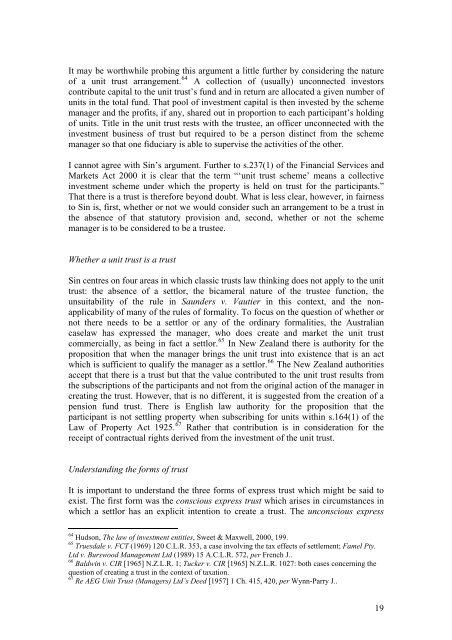The Unbearable Lightness of Property - alastairhudson.com
The Unbearable Lightness of Property - alastairhudson.com
The Unbearable Lightness of Property - alastairhudson.com
You also want an ePaper? Increase the reach of your titles
YUMPU automatically turns print PDFs into web optimized ePapers that Google loves.
It may be worthwhile probing this argument a little further by considering the nature<br />
<strong>of</strong> a unit trust arrangement. 64 A collection <strong>of</strong> (usually) unconnected investors<br />
contribute capital to the unit trust’s fund and in return are allocated a given number <strong>of</strong><br />
units in the total fund. That pool <strong>of</strong> investment capital is then invested by the scheme<br />
manager and the pr<strong>of</strong>its, if any, shared out in proportion to each participant’s holding<br />
<strong>of</strong> units. Title in the unit trust rests with the trustee, an <strong>of</strong>ficer unconnected with the<br />
investment business <strong>of</strong> trust but required to be a person distinct from the scheme<br />
manager so that one fiduciary is able to supervise the activities <strong>of</strong> the other.<br />
I cannot agree with Sin’s argument. Further to s.237(1) <strong>of</strong> the Financial Services and<br />
Markets Act 2000 it is clear that the term “‘unit trust scheme’ means a collective<br />
investment scheme under which the property is held on trust for the participants.”<br />
That there is a trust is therefore beyond doubt. What is less clear, however, in fairness<br />
to Sin is, first, whether or not we would consider such an arrangement to be a trust in<br />
the absence <strong>of</strong> that statutory provision and, second, whether or not the scheme<br />
manager is to be considered to be a trustee.<br />
Whether a unit trust is a trust<br />
Sin centres on four areas in which classic trusts law thinking does not apply to the unit<br />
trust: the absence <strong>of</strong> a settlor, the bicameral nature <strong>of</strong> the trustee function, the<br />
unsuitability <strong>of</strong> the rule in Saunders v. Vautier in this context, and the nonapplicability<br />
<strong>of</strong> many <strong>of</strong> the rules <strong>of</strong> formality. To focus on the question <strong>of</strong> whether or<br />
not there needs to be a settlor or any <strong>of</strong> the ordinary formalities, the Australian<br />
caselaw has expressed the manager, who does create and market the unit trust<br />
<strong>com</strong>mercially, as being in fact a settlor. 65 In New Zealand there is authority for the<br />
proposition that when the manager brings the unit trust into existence that is an act<br />
which is sufficient to qualify the manager as a settlor. 66 <strong>The</strong> New Zealand authorities<br />
accept that there is a trust but that the value contributed to the unit trust results from<br />
the subscriptions <strong>of</strong> the participants and not from the original action <strong>of</strong> the manager in<br />
creating the trust. However, that is no different, it is suggested from the creation <strong>of</strong> a<br />
pension fund trust. <strong>The</strong>re is English law authority for the proposition that the<br />
participant is not settling property when subscribing for units within s.164(1) <strong>of</strong> the<br />
Law <strong>of</strong> <strong>Property</strong> Act 1925. 67 Rather that contribution is in consideration for the<br />
receipt <strong>of</strong> contractual rights derived from the investment <strong>of</strong> the unit trust.<br />
Understanding the forms <strong>of</strong> trust<br />
It is important to understand the three forms <strong>of</strong> express trust which might be said to<br />
exist. <strong>The</strong> first form was the conscious express trust which arises in circumstances in<br />
which a settlor has an explicit intention to create a trust. <strong>The</strong> unconscious express<br />
64 Hudson, <strong>The</strong> law <strong>of</strong> investment entities, Sweet & Maxwell, 2000, 199.<br />
65 Truesdale v. FCT (1969) 120 C.L.R. 353, a case involving the tax effects <strong>of</strong> settlement; Famel Pty.<br />
Ltd v. Burswood Management Ltd (1989) 15 A.C.L.R. 572, per French J..<br />
66 Baldwin v. CIR [1965] N.Z.L.R. 1; Tucker v. CIR [1965] N.Z.L.R. 1027: both cases concerning the<br />
question <strong>of</strong> creating a trust in the context <strong>of</strong> taxation.<br />
67 Re AEG Unit Trust (Managers) Ltd’s Deed [1957] 1 Ch. 415, 420, per Wynn-Parry J..<br />
19













